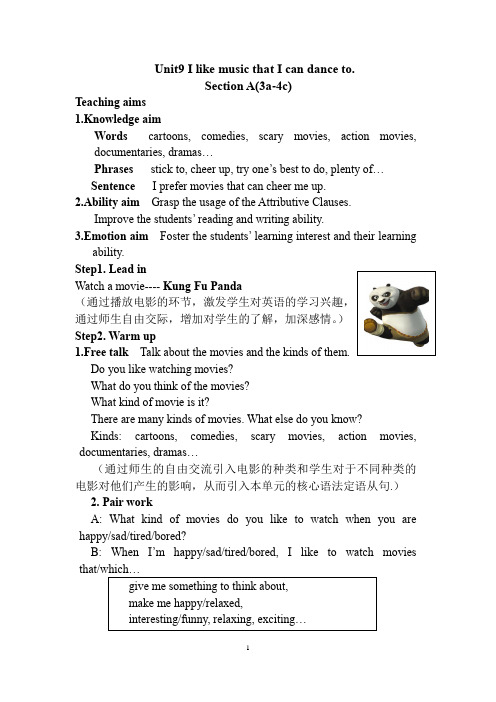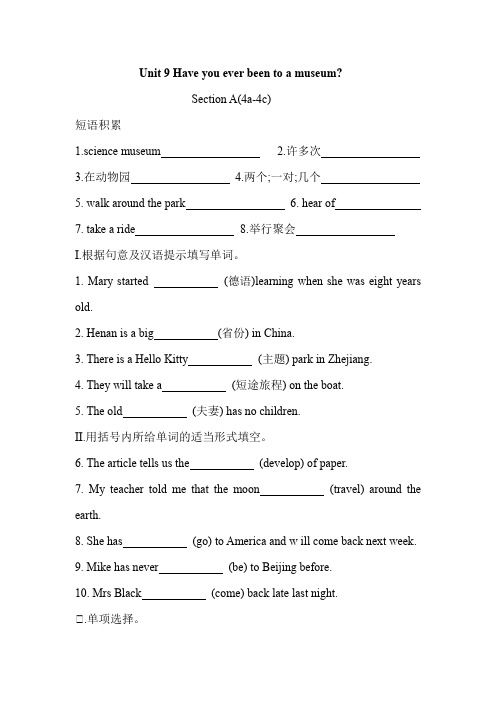英语八年级下册Unit 9 Section A (3a—4c)
人教新目标八下同步课时训练:Unit 9 Section A (3a-4c)(含答案)

[Unit 9 Section A (3a-4c)]Ⅰ.用方框中所给单词的适当形式填空1.The young bird can feed ________ now.2.The old man loves living in the ________ countryside.3.Three ________ are visiting our school now.4.I like watching the children's ________.5.I want to go to the ________. Can you show me the way?6.Bob's father has ________ to Beijing and he will get back in two weeks.7.It's the ________ movie that I've ever watched. I like it very much.8.Mary is worried, because she doesn't know how ________ English well.9.It's ________ that such a little boy can sing so well.10.My teacher always works out math problems in an ________ way.Ⅱ.改写句子按括号中的要求完成句子,每个空格填一个单词11.I've been to the art museum many times. (改为一般疑问句)________you ________ to the art museum many times?12.She has ever been camping outside. (改为否定句)She has ________ ________ camping outside.13.My father will come back home__in__two__days. (对画线部分提问)________ ________ will your father come back home?14.Getting different kinds of good food there is very easy. (改写句子,句意不变)________very easy ________ ________ different kinds of good food there.15.She has made rapid progress. (改写句子,句意不变)She has ________ in a ________ way.Ⅲ.完成句子根据汉语意思完成英语句子,每个空格填一个单词16.我们了解到随着科技的发展,人们的生活发生了很大的改变。
人教8下Unit9 Section A(3a-3c)教学设计

八下英语Unit9 sectionA 3a--3c教案一 Teaching goals:(一)Knowledge Aim .掌握一些重要的单词短语如invent progress rapid unusual encourage improve并如何表达现在完成时。
(二)Ability Aim用所学的语言have /has been to去描述某人曾经去过哪些有趣的地方。
(三)Emotion Aim了解国家和世界一些博物馆并热爱祖国悠久的历史。
二Important and difficult points (教学重难点)1 Key points掌握重要的一些短语和词汇和Have you ever been to ----?句式。
2 Difficult point学会描述去博物馆的句子。
三Teaching methodsCooperation and communication四Teaching aidsMultimedia devices and PPt documents五Teaching stepsTeaching of new lesson :Step 1 Lead--inAsksome: questions Have you ever been to an amusement park? Yes, I have.Me, too.Have you ever been to a history museum?No, I haven’t.Me neither.Step 2 Warm upAsk:Have you ever been to the museum?Look at some pictures of the Science Museum in London and talk about them.Pairwork:A: Have you ever been to…?B: No, I haven’t. / No, never. How about you?A: Me neither. / Neither have I.Step 3 Pre-taskAsk:Have you ever been to the Computer Museum?Have you ever been to the International Museum of Toilets? Have you ever been to the Hangzhou National Tea Museum?Step 4Presentation(一)3a:Read the magazine article and answer the questions.1.Which three museums do the students talk about?2. What do you think is the most interesting thing about each museum?(二)3b:Read the article again and answer the following questions.1What does Ken say about the American Computer Museum?2. What can we learn at the International Museum of Toilets?3. Why is the Hangzhou National Tea Museum a nice place to enjoy tea?(三)3c:Which of the underlined words in the passage have the following meanings(四)Free talk:Have you ever visited National Museum of China? (五)wacth a vidioDo you know these museums?Step5 Grammar FocusLanguage points1 Invent invent, discover, find, find out, look for2 It’s unbelievable that …令人难以置信的是…3 progress v. 取得进步,进展progress n. 进步,进展 make progress 取得进步;取得进展4 rapid adj. 快的;迅速的辨析:quick, rapid, fast5 even6 be able to 强调通过努力而获得的能力7 unusual adj. 不平常的8 encourage ... to ... 鼓励……做……9 improve作及物动词时,意为“改进;改善;提高”;作不及物动词时,意为“有改进;好一些”。
初中英语_Unit9IlikemusicthatIcandanceto.SectionA(3a-4c)教学设计学情分析教材分析课后反思

Unit9 I like music that I can dance to.Section A(3a-4c)Teaching aims1.Knowledge aimWords cartoons, comedies, scary movies, action movies, documentaries, dramas…Phrases stick to, cheer up, try one’s best to do, plenty of…Sentence I prefer movies that can cheer me up.2.Ability aim Grasp the usage of the Attributive Clauses.Improve the students’ reading and writing ability.3.Emotion aim Foster the students’ learning interest and their learningability.Step1. Lead inWatch a movie----Kung Fu Panda(通过播放电影的环节,激发学生对英语的学习兴趣,通过师生自由交际,增加对学生的了解,加深感情。
)Step2. Warm up1.Free talk Talk about the movies and the kinds of them.Do you like watching movies?What do you think of the movies?What kind of movie is it?There are many kinds of movies. What else do you know?Kinds: cartoons, comedies, scary movies, action movies, documentaries, dramas…(通过师生的自由交流引入电影的种类和学生对于不同种类的电影对他们产生的影响,从而引入本单元的核心语法定语从句.)2. Pair workA: What kind of movies do you like to watch when you are happy/sad/tired/bored?B: When I’m happy/sad/tired/bored, I like to watch moviesgive me something to think about,make me happy/relaxed,interesting/funny, relaxing, exciting…(对话环节的设置,给学生创造一个感知体验的过程,从而让学生对上节课的知识得以温习巩固,也为本节课的学习做好知识铺垫。
八年级下册英语第九单元3a笔记

八年级下册英语第九单元3a笔记
1. 首先,本单元的主题为“旅游”,主要探讨了旅游的意义和影响。
2. 其次,在听力部分,我们需要仔细听取对话内容,注意语音、语调和语气,以便更好地理解对话的含义。
3. 接下来,在阅读部分,我们需要仔细阅读短文,注意理解短文的主旨和细节,特别要注意一些关键词汇和句子的理解。
4. 总的来说,本单元的重点在于对旅游主题的理解和掌握,包括对话、短文和练习中的相关内容。
除了以上几点,还有一些需要注意的地方:
1. 在口语部分,我们可以围绕旅游主题展开对话,注意语言的运用和表达的准确性。
2. 在写作部分,我们可以尝试写一篇关于旅游的文章,注意文章的结构和语言的表达,可以适当运用一些修辞手法和句式变化。
最后,在复习和巩固阶段,我们可以将本单元的知识点进行总结和归纳,以便更好地掌握和理解。
同时,我们还可以通过做一些相关的练习题来加强自己的理解和记忆。
第 1 页共 1 页。
Unit 9 第3课时 Section A Grammar Focus -4c)(教学设计)八英语下

Unit 9 Have you ever been to a museum ?Section A Grammar focus-4c2.T asks Ss to read the sentencesin Grammar Focus again, workin groups and summarize thekey points.3.T asks Ss to find out the rulesof ever and never.4.T shows some sentences andasks Ss to find out the rules.5.T plays a video,Then expandsthe knowledge of the PresentPerfect Tense. 再读GrammarFocus并找出现在完成时的用法规律。
找出现在完成时中的ever和never用法。
找出havebeen to 、have gone to与have beenin的区别。
掌握现在完成时的特殊用法:瞬间动词。
的角色,有利于学生创造性思维的培养。
通过观察和总结,掌握现在完成时中的ever和never的语法规律。
通过观察和总结,掌握have been to 、have gone to 与have been in的区别。
教学过程中注意引用典例的趣味性,保持课堂气氛的活跃度。
6.T explains the the differencebetween the simple past tenseand the present perfect tense.掌握现在完成时和一般过去时的区别。
通过视频和典例,更直观的区别两者的不同。
Step 3 Presentation 1.Go through Activity 4a. T asksSs to read the sentences in 4aand put the correct forms of theverbs in the blanks.2.Check the answers.3.T plays a video and asks,Haveyou ever been to Disneylandbefore?4.T asks Ss to finish the task in4b---Fill in the blanks with thecorrect forms of the verbs inbrackets.5.T may ask 2 or 3 Ss to presenttheir answers.6.Free talk. How to introduce aplace you have been to?7.Pair work. Go through Activity4c. T asks some groups to telltheir answers to the class..完成4a。
人教版八年级英语下册教案Unit 9 Have you ever been to a museum.

Unit 9Have you ever been to a museum?本单元教材以“曾经去过某地”为中心话题,围绕着“现在完成时态的教学”进行,学习和运用几个常见的句型:—Have you ever been to a science museum?—Yes,I have.I went tothe National Science Museum last year./—I have never been camping.—Me neither./It also encourages governments and social groups to think about ways to improve toilets in the future./—I have been to the art museum many times.—Me,too.And I have also visited the nature museum.等。
在学习过程中,学生在交流中,能促进师生之间的感情。
Section A主要学习几个常见的动词短语及句型Have you been to…?应掌握句型:—Have you ever been to a science museum?—Yes,I have.I went to the National Science Museum last year.等。
通过一篇短文介绍了学生们曾经去过的最有趣的博物馆,增加了学生的阅读量。
Section B安排了听、说、读、写的任务,通过短文“Singapore—A Place You Will Never Forget!”介绍了新加坡的一些情况。
教师在教学中应合理利用课本上的知识进行教学。
第一课时Section A(1a-2d)Teaching Key Points【教学重点】The vocabulary:amusement,somewhere,camera,invention,history/space/art museum,put up,have a good time,water/amusement parkTarget language:1.—Have you ever been to a science museum?—Yes,I have.I went to the National Science Museum last year.2.I have never been camping.3.It's a great way to spend a Saturday afternoon.Teaching Difficult Points【教学难点】Use the target language above to talk about past experiences.Teaching Aids【教学工具】an English book,a tape recorder and CAITeaching Steps【教学过程】★Step 1Preview and perception【预习感知】Ask the students to read the vocabulary and target language.Ⅰ.英译汉。
2020-2021人教版英语八下Unit9 Section A(4a-4c)同步练习(含答案)

Unit 9 Have you ever been to a museum?Section A(4a-4c)短语积累1.science museum2.许多次3.在动物园4.两个;一对;几个5. walk around the park6. hear of7. take a ride 8.举行聚会I.根据句意及汉语提示填写单词。
1. Mary started (德语)learning when she was eight years old.2. Henan is a big (省份) in China.3. There is a Hello Kitty (主题) park in Zhejiang.4. They will take a (短途旅程) on the boat.5. The old (夫妻) has no children.II.用括号内所给单词的适当形式填空。
6. The article tells us the (develop) of paper.7. My teacher told me that the moon (travel) around the earth.8. She has (go) to America and w ill come back next week.9. Mike has never (be) to Beijing before.10. Mrs Black (come) back late last night.Ⅱ.单项选择。
( )11.-Would you like to go to the water park with me?-Sorry, I there many times.A. have goneB. have gone toC. have been toD. have been( )12. Mike e has been a teacher three years.A. inB. forC. sinceD. with( )13.-Jane, you of the Night Safari?-Yes, it's in Singapore.A. will; hearB. have; heardC. are; hearD. were; hearing( ) 14.Have you seen Frank recently?-No. He Hawaii for vacation He'll be back next week.A. has goneB. has beenC. has goneD. has been to ( )15. These are from Berlin.A. GermanB. GermenC. GermansD. GermensIV.根据汉语意思完成下列句子,每空一词。
人教版 八年级英语 下册 Unit_9_Have_you_ever_been_to_a_museum

dish.
Tapescripts:
Boy 1: So, Peter, how long have you been in China? Peter: I’ve been here for two weeks, but I’m going back to Australia tomorrow. Boy 1: Have you traveled much? Peter: Yes, I have. I’ve seen many interesting things. Boy 1: Have you visited the Palace Museum? Peter: Yes, I have. I went there last week. It was wonderful. There were so many beautiful treasures. Boy 1: And have you been to the Great Wall?
1st listening
1b
Listen to a student interviewing a foreign student. Check (√) the questions you hear.
___√_ Have you visited the Palace Museum?
___√_ Have you been to the Great Wall?
- 1、下载文档前请自行甄别文档内容的完整性,平台不提供额外的编辑、内容补充、找答案等附加服务。
- 2、"仅部分预览"的文档,不可在线预览部分如存在完整性等问题,可反馈申请退款(可完整预览的文档不适用该条件!)。
- 3、如文档侵犯您的权益,请联系客服反馈,我们会尽快为您处理(人工客服工作时间:9:00-18:30)。
Section A (3a—4c)
Ⅰ. 根据语境及所给首字母提示,补全所缺单词。
1. Your sister took a r train not a slow train.
2. —How many p are there in China?
—23. They are Hebei, Shanxi ...
3. —How do you like my painting?
—P . I think it’s the best painting that I’ve seen.
4. —It’s u Kate won the first prize in yesterday’s singing competition.—But it’s true.
5. The machine will start by i in two minutes, so you needn’t turn it on.Ⅱ. 根据句意及所给汉语提示,写出句中所缺单词。
1. Can you tell me where the ________(厕所) are?
2. Work on the new road is ________(进展) slowly.
3. The two tourists over there are ________(德国人).
4. Two ________(社会的) groups raised money for the poor last weekend.
5. I have ________(收集) all these books for you.
6. Ms. Jones always ________(鼓励) me in my studies.
Ⅲ. 根据句意及所给汉语提示,用恰当的短语填空。
1. Have you enjoyed ____________(茶艺) performances here?
2. This young man has lived here for ____________(几个) months.
3. In this store, we can see a number of ____________(茶具).
4. The store sells ____________(不同种类的) sweaters.
Ⅳ. 根据句意,选用been (to)或gone (to)完成句子。
1. Bob’s not here. He’s ________ work.
2. The office is empty (空的). Everybody has ________ home.
3. It’s good to see you again. Where have you ________?
4. My brother has ________ America four times.
5. Sorry, you can’t speak to Anna. She has ________ a party.
6. Mary’s hair looks nice. She’s just ________ the hairdresser’s (理发店).
7. Peter’s ________ Canada and he’s staying there for three weeks.
Ⅴ. 根据括号内所给提示,完成下面的对话。
Mike: I ________(see) a great film last night. It’s called Escape from the Edge.
________ you ________(see) it?
Laura: No, I ________(not be) to the cinema for a long time, but I ________(go) to the theater last week.
Mike: Really? What ________ you ________(see)?
Laura: It ________(be) a play called A Merry life.
答案
Section A (3a—4c)
Ⅰ. 1. rapid 2. provinces 3. Perfect 4. unbelievable 5. itself
Ⅱ. 1. toilets 2. progressing 3. Germans 4. social 5. collected 6. encourages Ⅲ. 1. tea art 2. a couple of / a few 3. tea sets 4. different kinds of
Ⅳ. 1. gone to 2. gone 3. been 4. been to 5. gone to 6. been to 7. gone to Ⅴ. saw; Have; seen; haven’t been; went; did;see; was。
